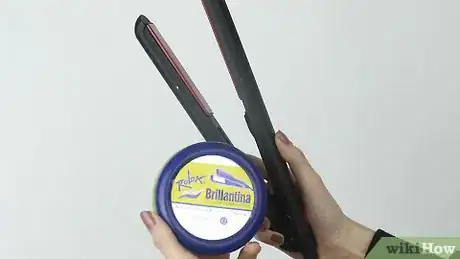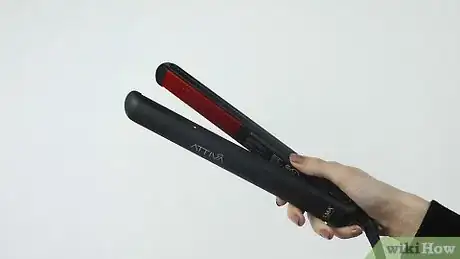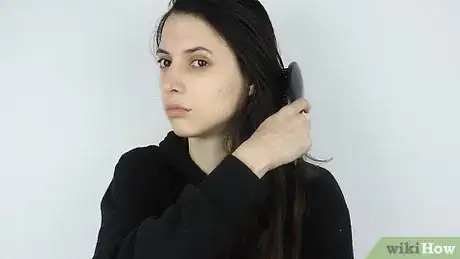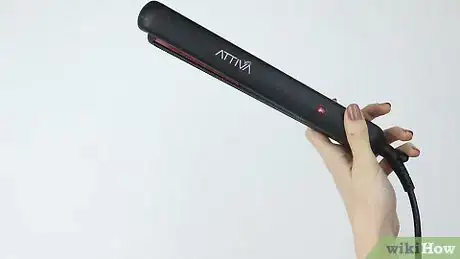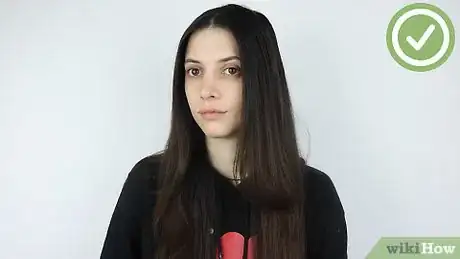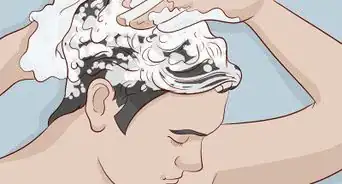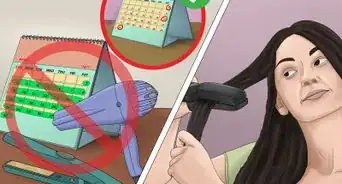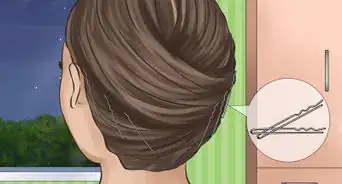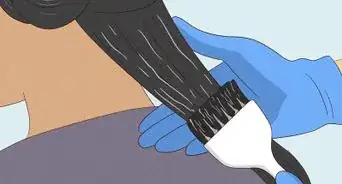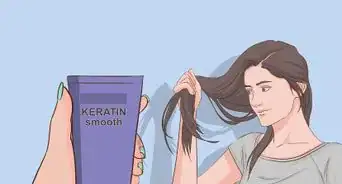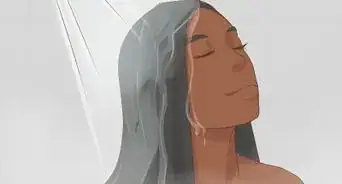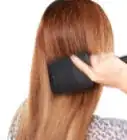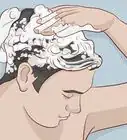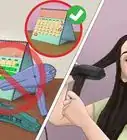This article was co-authored by Ashley Adams. Ashley Adams is a Licensed Cosmetologist and Hair Stylist in Illinois. She completed her Cosmetology education at John Amico School of Hair Design in 2016.
There are 11 references cited in this article, which can be found at the bottom of the page.
This article has been viewed 26,990 times.
Naturally wavy hair is gorgeous, though some days you might want a change of pace and decide you want to wear it straight. Especially if you have hair that is susceptible to frizz, you may have envied the sleek, elegant locks you've seen on others. To achieve that sleek, smooth look, all you'll need is a flat iron, some product to help protect and style your hair, and a little bit of patience.
Steps
Cleaning and Protecting Your Hair for Straightening
-
1Gather your hair straightening products. To straighten your hair, you'll be using a flat iron to apply heat to take out the waves in your hair. You should consider using a ceramic iron, as non-ceramic ones can damage your hair more easily or cause it to revert back to normal.[1] Including your flat iron, you'll also need:
- Flat iron
- Hair clips or ties
- Hair spray (optional)
- Hair straightening product (cream, mousse, etc.)
- Heat protectant
- Volumizer (optional)
-
2Choose the right flat iron for your hair. Flat irons come in many varieties and price ranges. You might have a simple flat iron with only high and low settings, or a space-age iron with a digital display for temperature. Temperature variable flat irons, where you can more precisely adjust the temperature, are an investment you will not regret, as these allow you to apply the right heat setting to your hair with greater accuracy, yielding better results.[2]
- Flat irons come in different sizes for different purposes:
½" Flat Iron: pixie cuts and bangs
1" Flat Iron: short and fine hair
1¼ Flat Iron: shoulder length and/or medium thick hair
1½" Flat Iron: thick, coarse, curly hair shoulder length or longer
2" Flat Iron: very long, very thick hair[3]
Advertisement - Flat irons come in different sizes for different purposes:
-
3Wash your hair, if necessary. Your hair should be clean before straightening to prevent oil and dirt from interfering with the process. Use a gentle shampoo while bathing to clean your hair, and consider using a conditioner intended for smoothing and detangling to make your hair more manageable.[4]
- Use a towel to remove as much excess moisture from your hair as possible to speed the drying process.
-
4Apply your straightener and heat protectant. You should follow the directions on these to ensure the best results. Generally, you should apply your straightener and heat protectant before you use any heat tools on your hair, but after it has been towel dried damp.
- Be sure you get all parts of your hair, including the roots, by massaging your product into your scalp.
- For most straightening products, a dime-sized amount should be sufficient for your hair.[5]
-
5Dry your hair completely. Avoid using a flat iron on damp hair as this can cause water locked inside to boil, leading to hair damage. To prevent your hair from harm, you should blow dry or air dry your hair until it is completely dry.[6]
- Use the cool setting of your blow dryer intermittently to prevent overheating your hair and damaging it while drying.
- Keep your blow dryer angled downwards while drying your hair to limit frizzing.[7]
- Try to get your hair as straight as possible with the blow dryer so you don't have to apply as much heat to it with the straightener.
- If your hair is particularly thick or coarse, separate it into sections so it's easier to dry.
-
6Brush your hair so that it is ready for styling. Tangles can make it difficult to separate your hair for straightening. Tangles can also make it difficult to keep straightened hair separate from the hair you've already straightened, which is important as straightening your hair too much can lead to damage.
Straightening Your Hair
-
1Heat up your flat iron. Always exercise caution while using your flat iron. Make sure not to leave it in a place where it can burn anything, including yourself. You should aim for a straightening temperature of 365°F (185°C) to gain the most styling benefits while minimizing potential heat damage.[8]
- If your hair is thin and fine, set your flat iron temperature closer to 300 °F (149 °C).
- If your hair is thick and coarse, you may need to set your flat iron temperature closer to 400 °F (204 °C).
- As long as your hair is of average thickness, even simple "high-low" model flat irons should work for your hair. Set the iron to "high" and work quickly to prevent fry.[9]
-
2Separate your hair into sections. Section your hair so that you can easily keep hair you've straightened apart from the rest. Your goal should be regular sections that are easy to work with. For most people, three sections should be enough, but if you have thicker hair, you will likely need more sections.[10]
- Divide your hair horizontally along the back of your head from ear to ear.
- Further separate your hair by parting your hair vertically at the middle of your horizontal part.
- Gather all hair above the horizontal line out of the way and to the top of your head.
- Divide your hair into .5–1 inch (1.3–2.5 cm) sections if it's particularly thick.[11]
-
3Iron your hair. Divide a two inch (5 cm) segment of your hair from the section you are currently straightening. Then take your flat iron and clamp it close to the roots of the segment, being careful not to burn your scalp in the process. Steadily slide the iron along the entire length of the segment until you reach the ends.[12]
- If after the first pass, your hair doesn't look straight enough, you should repeat the process.
- Be careful not to apply your iron too many times; this could lead to heat damage.[13]
-
4Continue to straighten your sections in segments. Once your segment is sufficiently straightened, you should release it and allow it to hang out of the way. Then divide another two inch (5 cm) segment from your section until that section is done.
- Repeat this process with the each section of your hair, until all parts of your hair are straight.
- Use a mirror when you believe you are finished to check that your hair has been completely straightened.
-
5Apply product when finished, if desired. A volumizing mousse or spray will help your straightened hair look fuller and give it more body. You might also want to spritz your hair with hairspray. This will hold it in place and prevent it from getting wavy again.[14]
-
6Finished.
Community Q&A
-
QuestionCan I apply serum before straightening my wavy hair?
 Community AnswerYes. Look for serums that moisturize and protect the hair from heat.
Community AnswerYes. Look for serums that moisturize and protect the hair from heat.
Warnings
- If it is a wet or humid day, the water in the air may cause your hair become wavy again.[15]⧼thumbs_response⧽
Things You'll Need
- Flat iron
- Hair clips or ties
- Hair spray (optional)
- Hair straightening product (cream, mousse, etc.)
- Heat protectant
- Volumizer (optional)
- Brush or comb
References
- ↑ http://www.personal.psu.edu/afr3/blogs/siowfa12/2012/12/how-does-heat-styling-hair-work-and-why-is-my-hair-the-way-it-is.html
- ↑ http://www.totalbeauty.com/content/gallery/flat-iron-tips/p72602/page3
- ↑ http://www.buzzfeed.com/augustafalletta/17-useful-tricks-for-anyone-who-uses-a-hair-straightener
- ↑ http://www.totalbeauty.com/content/gallery/flat-iron-tips/p72632/page6
- ↑ http://www.paulaschoice.com/expert-advice/hair-care-problems-and-solutions/_/the-best-way-to-straighten-curly-frizzy-hair
- ↑ http://www.paulaschoice.com/expert-advice/hair-care-problems-and-solutions/_/the-best-way-to-straighten-curly-frizzy-hair
- ↑ http://www.teenvogue.com/story/top-ten-flat-iron-mistakes
- ↑ http://www.marieclaire.com/beauty/news/a15722/flat-iron-perfect-temperature/
- ↑ http://www.totalbeauty.com/content/gallery/flat-iron-tips/p72602/page3
- ↑ http://www.totalbeauty.com/content/gallery/flat-iron-tips/p72652/page8
- ↑ http://www.hairfinder.com/techniques/sectioninghair.htm
- ↑ http://www.paulaschoice.com/expert-advice/hair-care-problems-and-solutions/_/the-best-way-to-straighten-curly-frizzy-hair
- ↑ http://www.teenvogue.com/story/top-ten-flat-iron-mistakes
- ↑ http://www.totalbeauty.com/content/gallery/flat-iron-tips/p72662/page9
- ↑ http://www.smithsonianmag.com/science-nature/why-humidity-makes-your-hair-curl-21127724/?no-ist
